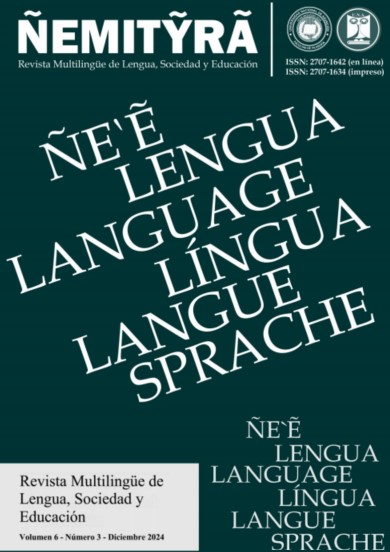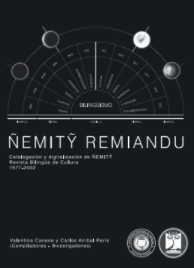The effects of role-playing games in second language acquisition
DOI:
https://doi.org/10.47133/NEMITYRA20240603c-A4Palabras clave:
role-playing games, education, motivation, language skills, participatory action researchResumen
The use of role-playing games (RPGs) in education has had a significant trajectory over the last fifty years. Once considered a negative activity to games such as Dungeons and Dragons, today it has the potential to be a versatile and powerful instructional tool, especially in language learning. This article addresses the integration and effects of RPGs in educational settings, exploring their effects on students' motivation, engagement, and language skills. The growing popularity of role-playing games in language teaching is highlighted, providing a context for research. The importance of this pedagogical strategy and its ability to transform traditional classrooms into dynamic and engaging environments is highlighted. The methods used in the research are detailed, focusing on the adaptation of RPG techniques in an educational setting. Previous research on the topic reveals that role-playing games have great potential in the educational setting. For example, in research that employs an experience point (XP) system based on tabletop RPGs, incentivizing responsible behavior through activities such as combat and decision making. Another study focuses on improving narrative comprehension through observation and participation in RPG sessions, demonstrating a direct improvement in students' creative writing skills. In the historical field, one thesis proposes transforming conventional narratives into role-playing games based on Greek mythology, Arthurian legends, and folktales, aligned with educational standards, and tested with high school and college students. An article connecting tabletop RPGs to various educational, recreational, and personal growth theories is also addressed. The research methodology encompasses a comprehensive analysis of relevant literature, the use of participatory action research in which role-playing techniques were tested, and an in-depth cross-analysis of the data collected. The research highlights that RPGs are powerful tools for enhancing knowledge assimilation, developing role-playing skills, fostering teamwork, and exploring individual developmental pathways. By incorporating RPG approaches into language classrooms, educators can create immersive and dynamic environments that inspire, engage, and promote language use in real-world contexts. In summary, integrating role-playing games into educational settings offers a variety of positive effects on motivation, engagement, language proficiency, social-emotional well-being, and 21st century skill development. By recognizing the potential of RPGs as an effective pedagogical approach, educators can design dynamic learning experiences that maximize student engagement and foster comprehensive language development.
Referencias
Adarkwah, M. A. (2021, March 09). The power of assessment feedback in teaching and learning: a narrative review and synthesis of the literature. SN Social Sciences, 1-75. https://doi.org/https://doi.org/10.1007/s43545-021-00086-w
Andrew Stott, C. N. (2013). Analysis of Gamification in Education. Burnaby: Simon Fraser University.
Bonwell, C. C. (1991). Active Learning: Creating Excitement in the Classroom. George Washington University.
Budden, J. (2004). Teaching English. Role-play: https://www.teachingenglish.org.uk/professional-development/teachers/planning-lessons-and-courses/articles/role-play
Cambridge Dictionary. (n.d.). Meaning of role-playing game in English - Cambridge Dictionary. Retrieved July 30, 2023.
Cambridge Dictionary. (n.d.). Significado de TTRPG en inglés - Cambridge Dictionary. Retrieved July 30, 2023.
Chesler, M., & Fox, R. (1966). Role-Playing Methods in the Classroom. Science Research Associates, Inc.
Collins, G., & Septiana, E. (2023). Role, play, and games: Comparison between role-playing games and. Role, play, and games: Comparison between role-playing games and.
Cook, M. P., Gremo, M., & Morgan, R. (2017). We’re Just Playing: The Influence of a Modified Tabletop Role-Playing Game on ELA Students’ In-Class Reading. Simulation & Gaming, 48(2), 199-218. https://doi.org/https://doi.org/10.1177/1046878116684570
Daniau, S. (2016). The Transformative Potential of Role-Playing Games—:From Play Skills to Human Skills. Simulation & Gaming, 47(7), 423-444. https://doi.org/10.1177/1046878116650765
Edith Cowan University. (2016, November 17). Role Play : Teaching Strategies : Curriculum Design : Learning. (Edith Cowan University) Retrieved July 30, 2023, from ECU Intranet: https://intranet.ecu.edu.au/learning/curriculum-design/teaching-strategies/role-play
Gygax, G., & Arneson, D. (1974). Dungeons and Dragons (1st ed.). Lake Geneva, United States of America: Tactical Studies Rules.
Hoffman, A., Utley, B., & Ciccarone, D. (2008, April 11). Improving medical student communication skills through improvisational theatre. Medical Education, 42(5), 537-538. https://doi.org/10.1111/j.1365-2923.2008.03077
Hutchcraft, J. (2020, November 23). Role-Play Games like Dungeons & Dragons in the Classroom Help Children Explore Their Identity. iNews: https://inews.co.uk/news/education/role-play-games-dungeons-and-dragons-explained-children-learning-769134
Jacobs, S. (2016, June 3). The Use of Participatory Action Research within Education-Benefits to. World Journal of Education, 6(3), 48-55. https://doi.org/10.5430/wje.v6n3p48
Koster, R. (2005). A Theory of Fun for Game Design. Paraglyph Press.
Mike Mearls, J. C. (2018). Mordenkainen's Tome of Foes (Vol. 1). (M. C. Kim Mohan, Ed.) Renton, United States of America: Wizards of the Coast.
Ntokos, K. (2019). Swords and sorcery: a structural gamification framework for higher education using role-playing game elements. Research in Learning Technology, 27, 1-16. https://doi.org/10.25304/rlt.v27.2272
Olivo, M. G. (2021). “Time Management Of Teachers And Its Relationship To Teaching Performance”. International Journal of Multidisciplinary.
Prager, R. H. (2019). Exploring the Use of Role-Playing Games in Education. Master of Teaching Research(2), 1-8.
Vygotsky, L. (1978). Mind in society: The development of higher psychological processes (14th ed.). Cambridge, MA, England: Harvard University Press.
Youakim, G. (2019). Dungeon Classroom Guide: Using Tabletop Role-Playing Games in (Vol. 12). Minneapolis, Minnesota, United States of America: Honors Capstone Projects.
Zalka, C. V. (2012). Adventures in the Classroom Creating Role-Playing Games Based. Electronic Theses and Dissertations. Paper 1469
Descargas
Publicado
Número
Sección
Licencia
Derechos de autor 2024 Andrés Giménez y Revista Ñemitỹrã

Esta obra está bajo una licencia internacional Creative Commons Atribución 4.0.










